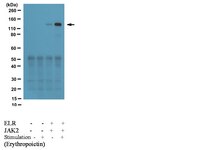07-1318 Sigma-AldrichAnti-phospho-JAK2 (Tyr317) Antibody
Detect phospho-JAK2 (Tyr317) using this Anti-phospho-JAK2 (Tyr317) Antibody validated for use in WB.
More>> Detect phospho-JAK2 (Tyr317) using this Anti-phospho-JAK2 (Tyr317) Antibody validated for use in WB. Less<<Recommended Products
Overview
| Replacement Information |
|---|
Key Specifications Table
| Species Reactivity | Key Applications | Host | Format | Antibody Type |
|---|---|---|---|---|
| H | WB | Rb | Serum | Polyclonal Antibody |
| References |
|---|
| Product Information | |
|---|---|
| Format | Serum |
| Presentation | Rabbit serum with 0.05% sodium azide. |
| Quality Level | MQ100 |
| Applications | |
|---|---|
| Application | Detect phospho-JAK2 (Tyr317) using this Anti-phospho-JAK2 (Tyr317) Antibody validated for use in WB. |
| Key Applications |
|
| Physicochemical Information |
|---|
| Dimensions |
|---|
| Materials Information |
|---|
| Toxicological Information |
|---|
| Safety Information according to GHS |
|---|
| Safety Information |
|---|
| Packaging Information | |
|---|---|
| Material Size | 100 µL |
| Transport Information |
|---|
| Supplemental Information |
|---|
| Specifications |
|---|
| Global Trade Item Number | |
|---|---|
| Catalog Number | GTIN |
| 07-1318 | 04053252586903 |
Documentation
Anti-phospho-JAK2 (Tyr317) Antibody SDS
| Title |
|---|
Anti-phospho-JAK2 (Tyr317) Antibody Certificates of Analysis
| Title | Lot Number |
|---|---|
| Anti-phospho-JAK2 (Tyr317) | 3076541 |
| Anti-phospho-JAK2 (Tyr317) - 3205952 | 3205952 |
| Anti-phospho-JAK2 (Tyr317) - NG1838178 | NG1838178 |
| Anti-phospho-JAK2 (Tyr317) - NRG1643466 | NRG1643466 |
| Anti-phospho-JAK2 (Tyr317) -2712451 | 2712451 |








[04-1098_IH(P)-ALL].jpg)